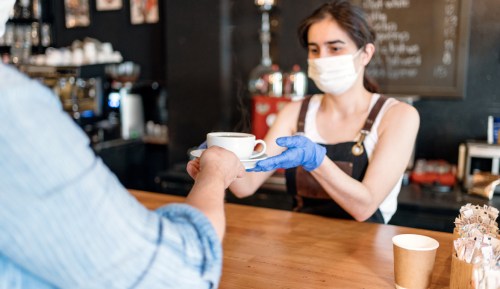In most cities and towns, there are (blessedly) no shortage of places to buy a cup of coffee. No matter where you live in the U.S., you’re never 170 miles away from a Starbucks, and chances are one—or several—are much closer to where you are right this minute.
Experts in This Article
Or maybe you’re more of a Dunkin’ person; the bold orange and pink lettering might as well read “welcome home.” Prefer someplace that feels more contemporary? Blue Bottle Coffee may be more your style. The point is, you have options. When figuring out where to spend your cold hard cash on a regular basis, there are some factors that you can pick up on right away, like the vibe or if they have your favorite alternative milk on the menu. But the level of eco-friendliness isn’t always apparent right away; it can take some investigating.
That’s exactly what the sustainability experts at Brightly decided to do. Their team looked into seven coffee chain giants, comparing them on several important sustainability factors. The coffee chains they looked into are Starbucks, Dunkin’, Peet’s Coffee, The Coffee Bean & Tea Leaf, Biggby Coffee, Dutch Bros, and Blue Bottle Coffee. “We decided which coffee chains to consider based on popularity and reach.” says Laura Wittig, co-founder and CEO of Brightly.
When conducting their report, the Brightly team took into consideration five sustainability factors, ranking them on a scale from one to 10 for each one: certifications (such as Fair Trade or Certified Organic), cup recyclability, commitments to reduce waste, commitments to a sustainable future, and whether the chain offers planet-friendly options. All five of these factors were given equal weight. “The highest-ranking coffee chains were well-rounded, factoring in multiple different aspects of sustainability,” Wittig says.
Can you guess which coffee chain came out on top? Check out the official ranking below, in the order from most to least sustainable:
1. Blue Bottle Coffee (score 21/25)
2. Peet’s Coffee (score 20/25)3. Dunkin’ (score 16/25)4. Starbucks (score 15/25)5. The Coffee Bean and Tea Leaf (score 12/25)6. Biggby Coffee (score 11/25)7. Dutch Bros (score 8/25)
According to the report, one of the reasons Blue Bottle Coffee ranked the highest is because of its mindfulness in choosing Certified Organic, single-origin coffee—which is more sustainable than mass-produced coffee. They also work directly with World Coffee Research, the Coffee Quality Institute, and the Specialty Coffee Association. The chain is also committed to being zero-waste, meaning 90 percent of its waste will not end up in a landfill.
Peet’s wasn’t too far behind Blue Bottle Coffee, scoring just one point lower. The Brightly researchers gave them props for having Certified Organic coffee that’s Fair Trade certified. Unlike the other chains on the list, Peet’s coffee lids are compostable, and of course, the cups themselves are recyclable. Peet’s also founded World Coffee Research, which supports the production of more sustainable coffee varieties. That’s an effort that extends beyond just their own business; it helps coffee companies across the board become more eco-friendly, too.
Two of the world’s most popular coffee chains, Dunkin’ and Starbucks, fell smack dab in the middle of the ranking. Both chains earned points for their planet-friendly menu options (Dunkin even has Beyond Sausage on the menu), but they lack in the areas of sustainability certifications, cup recyclability, and commitments to reducing waste compared with Blue Bottle Coffee and Peet’s.
At the very bottom of the list is Dutch Bros, a Northwestern favorite. While you will find eco-friendly plant milks on the menu, they don’t have any certification in terms of sustainability—not even certified organic. They also lost points for their single-use cups, which are difficult to recycle.
Is it healthy to drink coffee every day? Watch the video below to find out:
Of course, not everyone has access to Blue Bottle or Peet’s. But Wittig says no matter what coffee place you frequent, there are steps you can take to make your caffeine habit as sustainable as possible. “No matter where you order your coffee, bring a reusable cup to limit single-use plastic,” she says. “When making coffee at home, buy from brands that have the same values as you, whether that’s being Fair Trade Certified or having sustainable packaging.”
Wittig also says to save your coffee grounds. “Instead of tossing them, reduce waste by using them creatively, like making an exfoliating face mask or body scrub,” she says.
These small actions really make an impact—especially if you drink coffee every day. And when you do buy coffee out, supporting places that make an effort in terms of sustainability raises the bar for other brands to do the same. After all, there’s a lot of places to buy a latte. Why not support a business that is doing the work?
Oh hi! You look like someone who loves free workouts, discounts for cutting-edge wellness brands, and exclusive Well+Good content. Sign up for Well+, our online community of wellness insiders, and unlock your rewards instantly.
Sign Up for Our Daily Newsletter
Get all the latest in wellness, trends, food, fitness, beauty, and more delivered right to your inbox.
Got it, you've been added to our email list.










